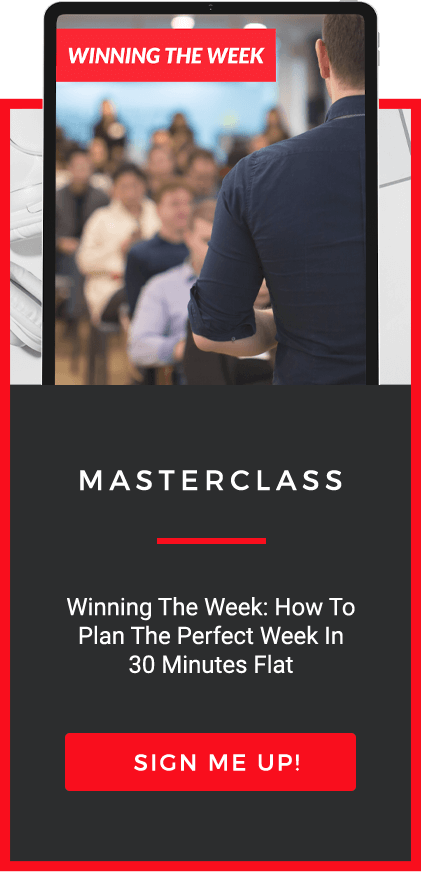
This blog post was originally published on Authority Magazine.
Match your energy to your work: Energy expends from Monday to Friday, morning to evening. We get more tired as the day and the week goes on. But you know what people are doing Monday morning? Wasting their time processing emails and sitting in meetings. We’re squandering our best energy early in the week doing low-value work, then trying to do important work later in the week, and then it takes us longer to get it done because we’re tired. Instead, match your most important work when you have your best energy, and see yourself work faster and get tons of time back.

Millions of Americans are returning back to work after being home during the pandemic. While this has been exciting for many, some are feeling burned out by their work. What do you do if you are feeling burned out by your work? How do you reverse it? How can you “get your mojo back”? What can employers do to help their staff reverse burnout?
In this interview series called “Beating Burnout: 5 Things You Should Do If You Are Experiencing Work Burnout,” we are talking to successful business leaders, HR leaders and mental health leaders who can share insights from their experience about how we can “Beat Burnout.”
As a part of this series, I had the pleasure of interviewing Demir Bentley.
Demir Bentley is a productivity expert and co-founder of the Lifehack Method. He helps his clients kick butt at work to live their best life when they go home. His hard-hitting efficiency techniques and proven accountability strategies have helped clients generate millions in revenue while saving thousands of hours.
In the past eight years, he’s helped more than 50,000 professionals (including executives from Facebook, Google, Uber and PepsiCo) prevent burnout and create more freedom in their lives.

Thank you so much for joining us in this interview series! Before we dive into the main focus of our interview, our readers would love to “get to know you” a bit better. Can you tell us a bit about your childhood backstory?
It’s hilarious to my family that I’m a productivity coach because growing up, I was the most disorganized, scattered, head-in-the-clouds boy. I was the kind of kid who absentmindedly put on his shirt backwards AND inside-out.
I’m very empathetic towards people who feel naturally disorganized and scatterbrained, because I’m that way myself. It’s the reason I believe in what I coach so much, because without the tactics I show my clients, I would never have achieved the level of success I now have.
My clients know that if I could become the kind of person who runs a seven-figure business working just 4 hours a day, anyone can do it.
What or who inspired you to pursue your career? We’d love to hear the story.
Despite my organizational skills, I was successful in school and then had a successful career on Wall Street simply because of my ability to work hard and put in longer hours than anyone else.
But what I thought was an essential skill ended up biting me in the butt, because it led quickly to burnout. I was regularly working 80–100 hour workweeks and my weight ballooned up.
One day I collapsed at work and was rushed to the hospital. I had to have emergency surgery and was eventually diagnosed with “Salary Man Sudden Death Syndrome” (yes, it’s a thing). My doctor ordered me to cut my working hours in half, which I thought was impossible at the time.
But with the threat of early death hanging over my head, I quickly cut my hours to 40 a week and 2 months later, to just 2 hours a week using the methods that have now become the Lifehack Method. I never intended to teach it to others, but when friends started asking me how I managed such a significant turnaround, my wife Carey and I started sharing what we were doing.
It got so much interest, and I love coaching people, so 8 years ago we started the Lifehack Method and it became our full-time gig.
None of us can achieve success without some help along the way. Was there a particular person who you feel gave you the most help or encouragement to be who you are today? Can you share a story about that?
My wife Carey has been such a huge part of my success. She is the leader of our company and gives me the creative freedom to explore new, crazy ideas to help our clients (most of them counterintuitive!).
I remember when I first pitched her on the idea of leaving LA and traveling full time (this was before we started our business). I was convinced we could actually save more money while traveling than we were living in LA. Back then, the digital nomad trend had barely emerged, so the idea of ditching our apartment and packing our whole life into 3 bags sounded totally crazy.
Carey wasn’t convinced at first — but then, she whipped up a spreadsheet and did the math herself. Once she saw my logic, she was crazy enough to say yes (that’s what I love about her!) — and the next month, we sold all our possessions and left for Bali. We’ve never come back. Now, we live as expats in Medellín, Colombia.

Can you share the funniest or most interesting mistake that occurred to you in the course of your career? What lesson or take away did you learn from that?
When Carey and I decided to take two weeks to sail the coast of Croatia while running our business, we thought our clients might object to us “taking vacation” while still coaching them. This was when our business was still nascent and we couldn’t afford to lose clients.
So we kept it all a secret, until the very last day of the trip when I was taking a call from the deck of the sailboat and saw a dolphin jump out of the water. Without thinking about it, I exclaimed, “Oh my gosh a dolphin!” and accidentally spilled the beans to our clients.
Instead of being perturbed by our Croatian adventure, they LOVED it. They wanted to know everything about what we were doing. In hindsight, of course we should have known they would have been excited to see the behind-the-scenes of our adventures, and now we feel a bit silly about having kept it from them. Now, we’re much more forthcoming about sharing our workcations and mini-retirements because we know it can be inspiring for our clients.
Can you share your favorite “Life Lesson Quote”? Why does that resonate with you so much?
“It is not death that a man should fear, but he should fear never beginning to live.”
~Marcus Aurelius
Wow — what a punch to the gut and a constant reminder to me to always live a life I love now, rather than waiting until the future. I used to sacrifice happiness in the present moment, justified by the thought that I would create a more comfortable retirement. I now realize that it’s much more important to enjoy every moment I’m alive (while still planning for my future). That’s a big reason Carey and I are focused on working just 4 hours a day, traveling a lot, and creating financial independence.
What are some of the most interesting or exciting projects you are working on now? How do you think that might help people?
I’m excited about our book coming out in July, “Winning The Week: How To Plan A Successful Week, Every Week.” It’s about a productivity superpower that has been crucial to my success over the years and it’s one of the easiest things every knowledge worker should be doing in order to succeed in the 21st century.
It’s written for busy parents, remote workers, and small business owners who want to reclaim their sanity and end the week knowing that — no matter what craziness went down — they came out on top.
I’m honored that Dr. Marshall Goldsmith, Thinkers50 #1 Executive Coach and New York Times bestselling author, says it is “A simple yet powerful method to feel successful at the end of the week, regardless of what the week throws your way! Demir and Carey will radically change the way you approach your time management and teach you to plan for success.”
You can sign up to get the book on pre-order at lifehackmethod.com.

You are a successful business leader. Which three character traits do you think were most instrumental to your success? Can you please share a story or example for each?
- Charisma — I’m a natural people-pleaser, which can be a fault when taken to an extreme, but has benefited me in the sense that I’m good at understanding others and connecting with them. Connecting with others is one of life’s greatest joys and I’m grateful that charisma has made it easier to do.
- Vulnerability — I’m an ‘over-sharer’ and never hesitate to give my clients the real-deal scoop on what’s going on in my own life. They never see a “glossy” version of me, which makes it a lot easier for them to see how I’m tackling problems in the trenches alongside them.
- Positive Pessimism — While I always hope for the best, I plan for the worst. This keeps my expectations in check (because shattered expectations are at the root of most perceived problems!) and keeps me on course to achieve what I set out to achieve. I call this having “positive pessimism.” It’s like a balance between optimism and pessimism where instead of grumbling about your life, you stay focused on solutions.
For the benefit of our readers, can you briefly let us know why you are an authority about the topic of burnout?
I’ve coached over 50,000 professionals over the past 8 years, many of whom are in burnout or on the road to it. My focus with my coaching is to show professionals an anti-burnout productivity system, so they can get out and stay out of burnout permanently.
Ok, thank you for all of that. Let’s now shift to the main focus of our interview about beating burnout. Let’s begin with a basic definition of terms so that all of us are on the same page. How do you define “Burnout”? Can you explain?
Burnout means you’re completely miserable in your work. It happens when you’re chronically exhausted and anxious from having too much to do or working too long of hours. People who are burned out may feel that they’re constantly overwhelmed and unable to keep up with life’s demands. They may feel empty, mentally drained, cynical and unable to find the motivation to keep up with their responsibilities. And they might describe themselves as tired, stressed, and depleted.
How would you define or describe the opposite of burnout?
The opposite of burnout is feeling positive, hopeful, and productive as you go about your work. You are excited to tackle your to-do list, and feel proud of what you’re working on. After you’re done with work, you have the energy to engage in meaningful hobbies and social activities. Your friends and family describe you as joyful, productive, and positive.
This might be intuitive to you, but it will be instructive to expressly articulate this. Some skeptics may argue that burnout is a minor annoyance and we should just “soldier on’’ and “grin and bear it.” Can you please share a few reasons why burnout can have long-term impacts on our individual health, as well as the health and productivity of our society?
Being burned out keeps your body in a permanent state of stress. When you’re stressed, your body produces the hormone cortisol, which is meant to be a short-term “alarm system” to help you get away from danger.
However, if you’re under constant stress, this alarm system never gets shut off and can lead to anxiety, depression, heart disease, memory and concentration problems, chronic digestive issues, insomnia, and weight gain.
Often, when people become burned out, they don’t see an easy way out and end up quitting rewarding, lucrative careers that they’re really good at in order to get out of burnout. This is damaging to the productivity of our economy because what they really want is shorter working hours, not a different career.
When I ask my clients what their ideal job would be, 90% of them say “the same thing I’m doing right now, but with shorter hours.”
That’s why the solution to burnout is not to “grin and bear it.” Instead of soldiering on and hoping things get better on their own, you’ll need to take radical action to change what you do and how you do it in order to create a sustainable workflow that you love. The good news is that change can happen incredibly fast once you decide it’s time to take action.
From your experience, perspective, or research, what are the main causes of burnout?
The main cause of burnout is saying “yes” to everyone else’s demands on your time. I have clients trying to stretch themselves so thin that even if they worked 24 hours a day, they wouldn’t have time for everything they’ve committed to.
It’s an unsustainable way to work. Meanwhile, the tasks and projects that would actually get them to their own personal long-term goals are left by the wayside.

Fantastic. Here is the main question of our discussion. What can an individual do if they are feeling burned out by work? How does one reverse it? How can you “get your mojo back?” Can you please share your “5 Things You Should Do If You Are Experiencing Work Burnout?”. (Please share a story or an example for each.)
- Plan your week ahead of time.
This is something that we all know we should be doing, but we’re just not doing it! Studies show that people who plan their week are more calm and in control. They get more done, but they’re also more resilient when responding to obstacles in their week.
The number one tip for defeating burnout is to make an achievable plan for the coming week. But there’s a right way and a wrong way to plan your week. I have a free training available at winningtheweek.com that shows you how to plan a winning week in just 30 minutes.
2. Change the way you attack your task list.
My client Rhonda is a working mom with 3 kids. She was doing home learning and managing her job, all while cramped in a small apartment. She was drowning, but couldn’t see a way out.
I told her, Rhonda, life isn’t a fair fight. Life can come at you from all directions, but if you try to fight on all fronts you’ll lose. Life is just too big. The way to escape this kind of trap is to focus your limited energy on something that makes your life easier.
And she found one of those leverage points — something that saved her 15 hours a week — in a really unexpected place. She realized she was spending 20 hours a week on food prep for her family (choosing recipes, shopping, cooking, cleaning).
She bought into one of these meal box services and reduced that to less than 5 hours a week. Now, she’s saving 15 hours a week for the rest of time. That’s leverage. That’s why I tell my clients to do one thing every week to make their lives permanently easier. One thing that lightens the load. I promise you’ll feel the difference within a month, and you’ll be a different person within a year.
3. Match your energy to your work.
Energy expends from Monday to Friday, morning to evening. We get more tired as the day and the week goes on. But you know what people are doing Monday morning? Wasting their time processing emails and sitting in meetings.
We’re squandering our best energy early in the week doing low-value work, then trying to do important work later in the week, and then it takes us longer to get it done because we’re tired.
Instead, match your most important work when you have your best energy, and see yourself work faster and get tons of time back.
4. Stop warming up to important work.
I see so many of my clients wasting the first 3–4 hours of their day doing admin work. I ask, “Why weren’t you doing the important stuff?” They tell me, “I was warming up to the important stuff.”
Again, use your first tier energy to do that first tier work. Stop “warming up” by tackling those small-ball tasks. That’s going to lead to more burnout! Save second tier work for later in the day when you’ve got that second tier energy.
That one small tweak is a game changer.
5. Play your work like a game.
Burnout takes us to a place where we hate work and just try to avoid it. But have you ever seen a kid glued to a difficult video game? Totally focused but having a blast? You can bring that same focused energy to your work with something called gamification.
It’s when we add game-like aspects to our work to make it more engaging. My favorite way of doing this is timing myself. When I’m waiting for my wife to get ready to get out the door and I have 10 minutes, I’ll set a timer and see how much of the kitchen I can clean in 10 minutes. You wouldn’t believe how much cleaning I can do when I’m racing the clock!
Same with emails. I say to myself, “Let’s see how many emails I can process in the next 15 minutes.” When you make your work into a game like this, you do better quality work, faster…and it’s a whole lot more fun.
What can concerned friends, colleagues, and life partners do to help someone they care about reverse burnout?
If you notice burnout in someone else, you can offer to help them think through their task list and identify leveraged tasks. Often, when someone is in burnout, they can’t think clearly about their to-do list. Even thinking about it causes a swell of stress. That’s why having a third party there to review it with them can be so enlightening.
What can employers do to help their staff reverse burnout?
Employers need to help burned out staff members prioritize and cut down their to-do lists. What’s sad is that employees have been trained never to say “I have too much to do.” Their bosses, struggling with their own burnout, assume that they should be able to handle everything on their plate.
The best thing a good manager can do is sit down with each employee, get them clear on their number one priority (not a list of priorities) and make sure their to-do lists are rational and achievable.

These ideas are wonderful, but sadly they are not yet commonplace. What strategies would you suggest to raise awareness about the importance of supporting the mental wellness of employees?
We’ve been pushed to the brink over the last two years, and we desperately need to change our relationship to work. Knowledge workers need to know that overworking is not normal. Overwhelm is not inevitable. Change starts with you demanding a better way of working and living.
What are a few of the most common mistakes you have seen people make when they try to reverse burnout in themselves or others? What can they do to avoid those mistakes?
“Limiting Mindsets” start creeping in that can sabotage your results. I have identified 9 such limiting mindsets. One of my favorites that many of my clients find themselves thinking is, “This imperfect ___ is keeping me from results.”
This thought refers to the “if onlys” of life. People get obsessed with a crystal clear vision of what life should be. They have a picture in their head of how things could go perfectly — if only life would cooperate with their plans! This vision is ironic because if life has one consistent quality, it’s that it doesn’t cooperate with anyone’s plans. Despite this, we still develop strong expectations around our perfect solutions, which are then promptly dashed. Crestfallen, we use this as an excuse to play the victim:
“I could have been on time if only I hadn’t hit traffic!”
“I could have stuck to my diet if only it hadn’t been the holidays.”
“I could have quit smoking if only my wife had quit too.”
“We could have hit the deadline if only that last-minute emergency hadn’t popped up!”
A mindset shift away from this limiting belief is the realization that there are zero perfect solutions and infinite imperfect solutions.
Modern life is inherently chaotic, and it’s your job to navigate a path through those churning waters. They aren’t going to part for you like Moses and offer you a clear, uncontested pathway. Life will not cooperate with your vision of a perfect solution. Instead, you get to start looking at all the imperfect solutions. Imperfect solutions are the ones that concede to the chaos of life and participate anyway. For example, leaving early to get to your destination isn’t ideal because it risks wasting your time. It’s an imperfect solution that concedes to reality and ensures that you get the desired result (making it to that appointment on time), even if things go sideways.
And the good news is that you can choose from many imperfect solutions! While there is only one perfect solution, there are infinite imperfect solutions to every problem. While your ideal solution rarely works out, you’ll find that imperfect solutions perfectly fit our imperfect reality. (Wrap your head around that sentence!)
Ok, we are nearly done. You are a person of great influence. If you could inspire a movement that would bring the most amount of good for the greatest number of people, what would that be? You never know what your idea can trigger.
A movement we desperately need is to move away from always-on communication culture to a more flexible, limited communication system. Right now, employees are expected to be available 24/7 which contributes to burnout and the sense that if you aren’t available, you’ll fall behind in your work. Instead, we need to make being offline and unreachable for much of the day the norm.
We are very blessed that some of the biggest names in Business, VC funding, Sports, and Entertainment read this column. Is there a person in the world, or in the US, whom you would love to have a private breakfast or lunch with, and why? He or she might just see this, especially if we both tag them 🙂
Elon Musk, want to have lunch? 😉 Elon is someone who I admire for his ability to break the mold. In productivity, it’s essential to break out of the mold of your current workflow and current workplace norms if you want to have success. Elon models this on a grand level across many industries.
How can our readers further follow your work online?
I would love to help readers cut their working hours and design a sustainable workflow. I have a free training on all of the topics we covered today located at winningtheweek.com.
You’ll learn how to plan a winning week in less than 30 minutes, which like I said is the #1 thing that will make the biggest difference if you’re looking to feel more productive and regain control of your life.
Again this is a totally free gift that will transform how you live and work. Go to winningtheweek.com to sign up for this today.
Thank you for these really excellent insights, and we greatly appreciate the time you spent with this. We wish you continued success and good health!


